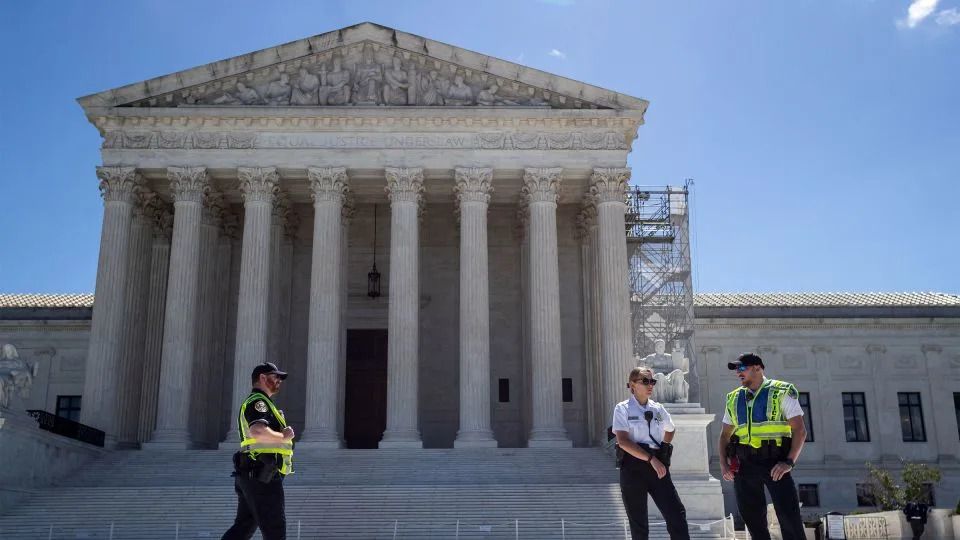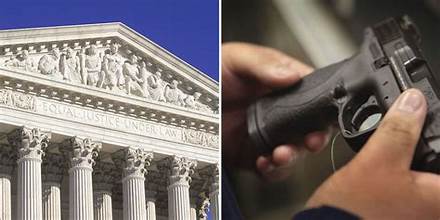Supreme Court declines to hear a series of challenges to laws barring felons and drug users from having guns

The Supreme Court said Tuesday that it won’t take up a challenge to parts of a federal law that bar convicted felons and drug users from possessing firearms, and let stand a ban on assault-style weapons in Illinois.
The decisions come days after the high court upheld a separate provision of the same federal disarmament law in the biggest Second Amendment case to reach the justices in two years. The court’s majority said a restriction on domestic abusers possessing firearms was constitutional because it was in line with a “tradition of firearm regulation” disarming dangerous individuals.
Weeks after the Second Amendment featured prominently on the court’s docket, the decisions on Tuesday amounted to a collective ducking of the issue of guns when the court returns in the fall.
Among the cases the court declined to hear is one that could have unraveled Hunter Biden’s federal firearms conviction.
The court sent the challenges to the federal firearms bans back down to a lower court with instructions to review the case in light of their ruling last month in US v. Rahimi.
In that case, Chief Justice John Roberts, writing for an 8-1 majority, said that a 2022 ruling from the court that changed the framework federal courts must use when examining the nation’s gun laws did not necessarily lock lower courts into striking down any gun law that didn’t have a direct historic analogue.
Some court watchers had speculated that the court’s opinion in Rahimi might address laws disarming felons, but the majority avoided directly wading into the legal debate over whether other federal gun prohibitions – including the one at issue in the present controversy – would also be upheld.
“At least for now, the court seems unwilling to jump right back into the messy fight that it touched off two years ago in the Bruen case with respect to exactly what the Second Amendment does and doesn’t prohibit,” said Steve Vladeck, CNN Supreme Court analyst and professor at Georgetown University Law Center.
“But the punt here is necessarily temporary; lower courts are already bitterly divided over how they’re supposed to review a number of different state and federal gun control laws,” Vladeck added. “It’s a good bet that, before their next term is over, the justices are going to have to step back in.”
The decisions to take or deny cases in the so-called clean-up list came a day after the Supreme Court handed down the final opinions of a contentious term, including the decision to grant sweeping immunity to former President Donald Trump.
The court also dodged a number of other high-profile matters, either by declining them outright or sending them back to lower courts. The justices, for instance, declined an appeal challenging Section 230, a controversial law that provides legal protection to social media companies for posting third-party content.
And it waved off a challenge about whether the Department of Labor can enforce workplace conditions on American businesses, an appeal that could have further weakened the power of federal agencies.
While that case was ostensibly focused on one agency, OSHA, the political and legal underpinnings were far deeper: Conservatives have for years sought to revive what’s known as the nondelegation doctrine, the idea that Congress can’t hand off legislative decisions to the executive branch. A ruling against the Labor Department could have had profound implications for the balance of power between the branches of government.
Disarming drug users
The case related to Hunter Biden, US v. Daniels, was being closely followed because he was convicted in June of violating the same disarmament law at issue in the case, as well as two other federal firearm laws. His attorneys have consistently pointed to the Daniels case, in which a federal appeals court said the law was unconstitutional, as they sought to challenge his prosecution. Biden’s attorneys are expected to lean on the appeals court ruling as they raise a post-conviction appeal.
Patrick Daniels was stopped in 2022 for driving without a license plate. A search of the car uncovered several marijuana cigarette butts, a loaded pistol and a loaded rifle. The officers did not administer a drug test the night of the stop, but Daniels admitted that he was a frequent user of marijuana.
A federal grand jury indicted Daniels for possessing a firearm as an unlawful user of a controlled substance, and a jury later convicted him of violated the firearms law.
He had initially challenged the charges before conviction, citing Bruen. But a federal judge denied his request to throw out the indictment.
A New Orleans-based appeals court later reversed, ruling last August that the law was unconstitutional as applied to Daniels.
“In short, our history and tradition may support some limits on an intoxicated person’s right to carry a weapon, but it does not justify disarming a sober citizen based exclusively on his past drug usage,” Circuit Judge Jerry Smith, a Ronald Reagan appointee, wrote for the three-judge panel. “Nor do more generalized traditions of disarming dangerous persons support this restriction on nonviolent drug users.”
Illinois ban on assault-style weapons remains in effect
The other cases the court declined to hear include ones challenging an Illinois law that bans semi-automatic weapons with certain features, such as those that have detachable magazines and also pistol grips, flash suppressors or removable stocks that make them easier to conceal.
Justice Samuel Alito, among the court’s stalwart conservatives, said he would have granted the Illinois cases dealing with assault-style weapons but did not write to explain his reasoning.
Justice Clarence Thomas, also a conservative, was the only member of the court who wrote on the matter.
“We have never squarely addressed what types of weapons are ‘arms’ protected by the Second Amendment,” Thomas wrote. The “minimal guidance” the court has provided on the issue “is far from a comprehensive framework for evaluating restrictions on types of weapons, and it leaves open essential questions such as what makes a weapon ‘bearable,’ ‘dangerous,’ or ‘unusual.’”
Gun rights groups have framed state bans on AR-style semi-automatic weapons as unconstitutional, particularly in light of blockbuster Supreme Court decisions in recent years that have vastly expanded the scope of the Second Amendment.
They argue the weapons banned under the laws are “common” and that “labeling them ‘assault weapons’ is nothing more than an argument advanced by a political slogan in the guise of a definition.”
New York’s conceal-carry gun law
The Supreme Court also declined to hear arguments from six New York residents challenging the state’s recently approved regulations on carrying concealed firearms, including in “sensitive” places such as schools, parks and concert venues.
The decision to send that case back to lower courts for further review leaves in place most of a New York law approved in response to the Second Amendment blockbuster ruling two years ago. The legal fight over the new law will continue in lower courts and could return to the Supreme Court.
Ban on felons possessing guns
The felon disarmament cases involve individuals who are challenging their convictions for violating a federal law that prohibits felons – both violent and non-violent – from possessing a gun.
The people at the center of those disputes include a man who pleaded guilty in 1995 to a single misdemeanor charge of welfare fraud under Pennsylvania law and a man whose criminal record included convictions in Iowa state courts for theft, aggravated use of a weapon, aggravated assault and intimidation with a dangerous weapon.
In some of those cases, the Justice Department told the court that it needed clarity on whether that felon disarmament law is constitutional given how frequently it brings criminal cases under it, pointing to some 7,600 cases from fiscal year 2022 alone.
“The present conflict is unlikely to resolve itself without further intervention by this court,” Solicitor General Elizabeth Prelogar told the justices in court papers, adding that disagreement among lower federal courts about the law’s constitutionality “is undermining public safety.”
“District courts have struck down (the felon disarmament law) even as applied to exceptionally dangerous felons, including murderers, carjackers, and drug traffickers – and in some cases have ordered that the defendants be released pending appeal,” Prelogar wrote.
–
Source: CNN



